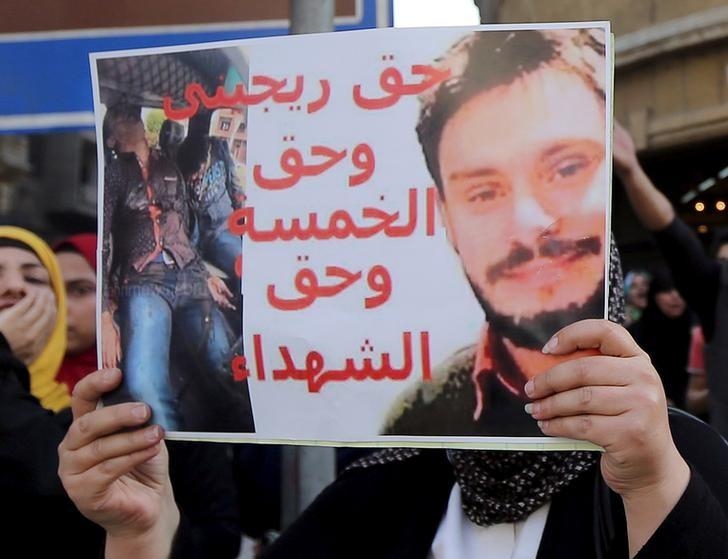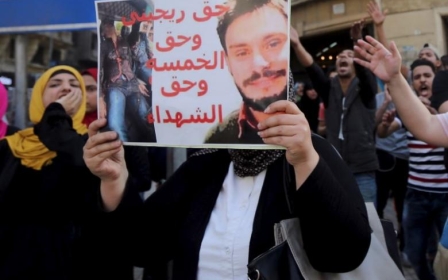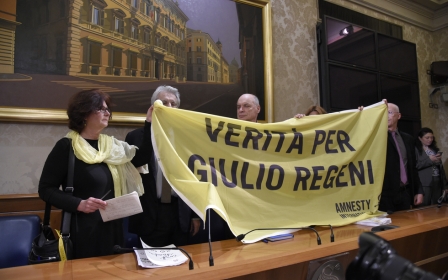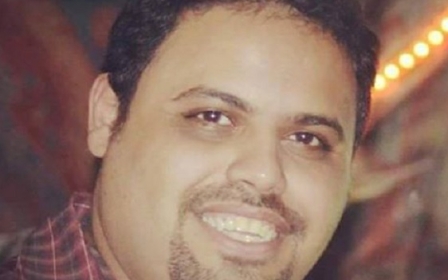Egyptian state TV broadcasts video of murdered student Regeni

Egyptian state television has broadcast footage of an Italian student who was found murdered in Cairo almost a year ago speaking to the head of a Cairo street vendors' union who reported him to police a few weeks before his death.
Giulio Regeni, who was 28 when he was killed, was conducting postgraduate research into Egyptian trade unions and was last seen by friends on 25 January 2016. His body, showing signs of extensive torture, was found in a roadside ditch outside Cairo on 3 February.
Egyptian officials have denied any involvement in Regeni's death. Security and intelligence sources told Reuters in April that he had been arrested in Cairo on 25 January, and taken into custody.
In the video, the union head, Mohamed Abdallah, is heard repeatedly asking Regeni for money, without success. "My wife has a cancer operation, I will do anything as long as there is money in it," he says.
Regeni says, in Arabic: "Mohamed, I cannot use the money because it is not my money. I cannot use it like that because I am an academic. I cannot tell the institution in Britain in the application that I want to use the money for personal reasons."
Regeni explains that he would help Abdallah to apply for a grant or workshop worth "10,000 pounds" for union activities but not for personal use.
Abdallah says: "Is there no other way? A way with personal use?"
An Italian news website had earlier aired the full conversation between Regeni and Abdallah showing that Regeni had repeatedly refused the latter's request for money. However Egyptian state TV only aired a short clip that seemed to suggest that Regeni might have been a spy with foreign funding.
The airing on Egyptian state TV of only part of the footage elicited angry reactions from social media users and renewed previous suspicions of state involvement in the Italian student's murder.
Surveillance confirmed
On Monday, Abdallah confirmed to Reuters that he had recorded the video on his mobile phone and that his voice was heard on it. He said the discussion had probably taken place on 6 or 7 January.
He also confirmed his earlier statement that he had reported Regeni to the police in early January 2016, and denied that he had acted out of frustration with Regeni's refusal to give him money. He told Reuters that it had been his "national duty" to pass on to police his suspicions that Regeni was a spy.
Foreign funding of civil society groups such as labour unions is frowned upon by the government, which suspects that overseas NGOs helped to destabilise Egypt before an uprising that toppled President Hosni Mubarak in 2011.
"Any good citizen would have done what I did," Abdallah said. "What he was talking about (offering to help secure funding for the union) gave me a feeling that it was related to spying, and so I told the authorities. What's wrong with that? I should be applauded."
He said the sum discussed in the video was 10,000 pounds sterling ($12,500), not 10,000 Egyptian pounds ($530).
Egyptian and Italian prosecutors said in December that Abdallah had raised concerns with police that Regeni was harming national interests, and that police had carried out checks but found nothing of interest and stopped watching the Italian.
Khaled Mhani, director of news at state television, said the video had been provided by the public prosecutor's office and broadcast at the prosecutor's request. The prosecutor's office could not be reached for comment.
On Sunday, the prosecutor gave the green light to experts from Italy and a German company that specialises in salvaging closed-circuit TV footage to examine cameras in Cairo as part of the investigation into Regeni's death.
Italy has complained that the investigation is taking too long, and withdrawn its ambassador to Cairo.
New MEE newsletter: Jerusalem Dispatch
Sign up to get the latest insights and analysis on Israel-Palestine, alongside Turkey Unpacked and other MEE newsletters
Middle East Eye delivers independent and unrivalled coverage and analysis of the Middle East, North Africa and beyond. To learn more about republishing this content and the associated fees, please fill out this form. More about MEE can be found here.




